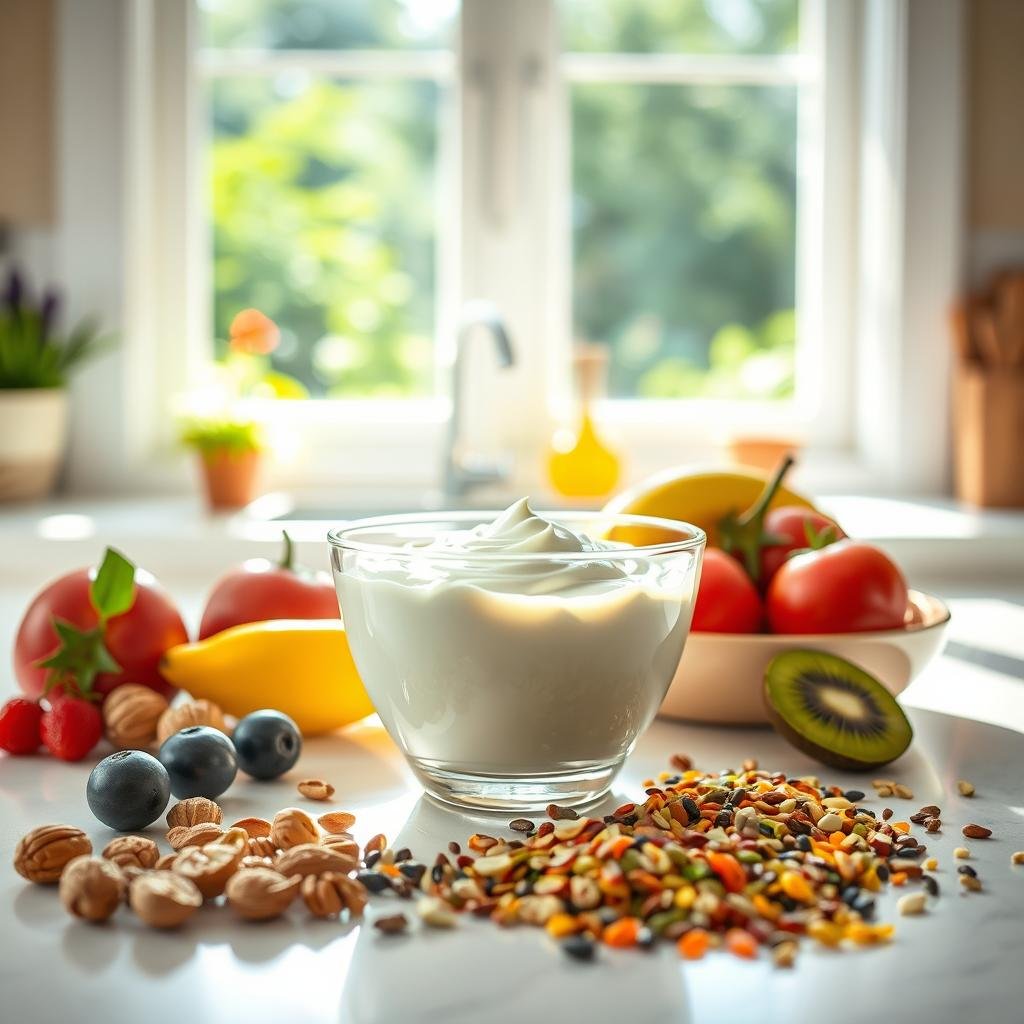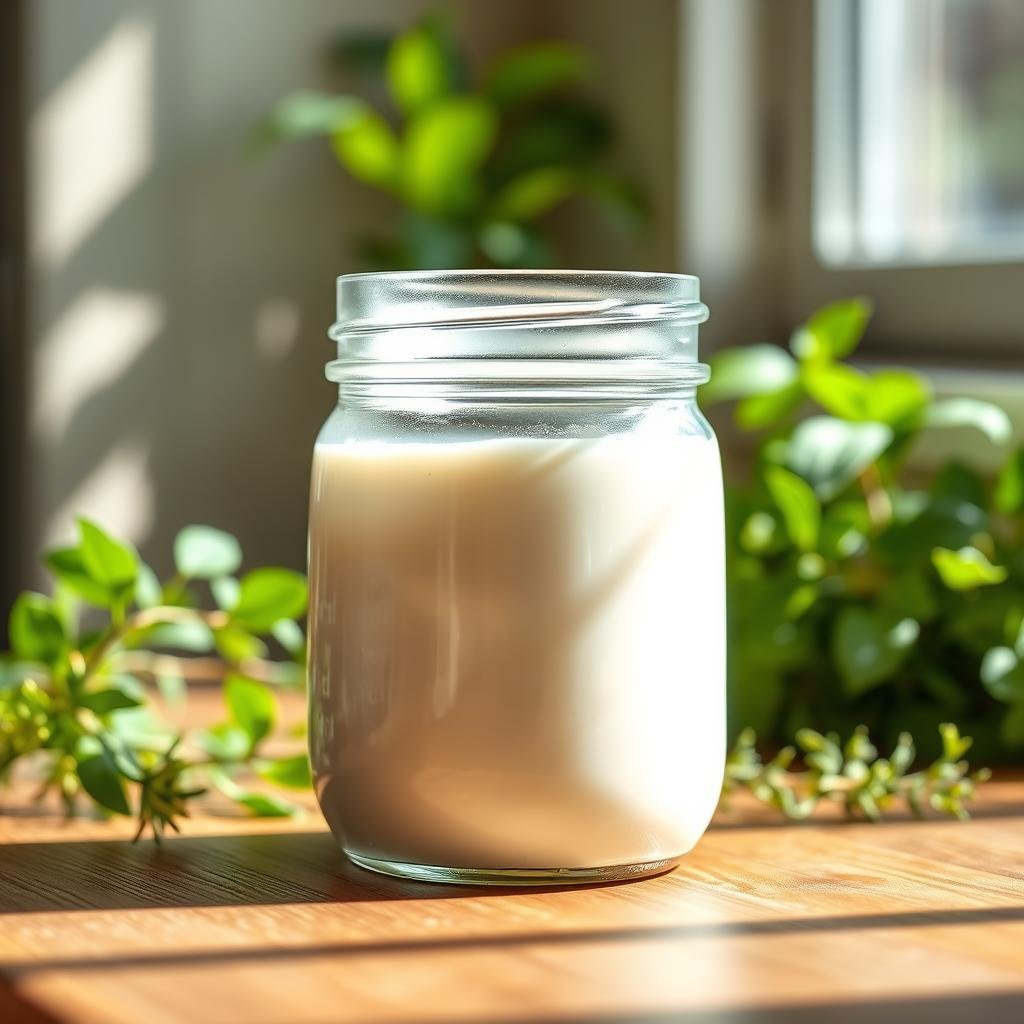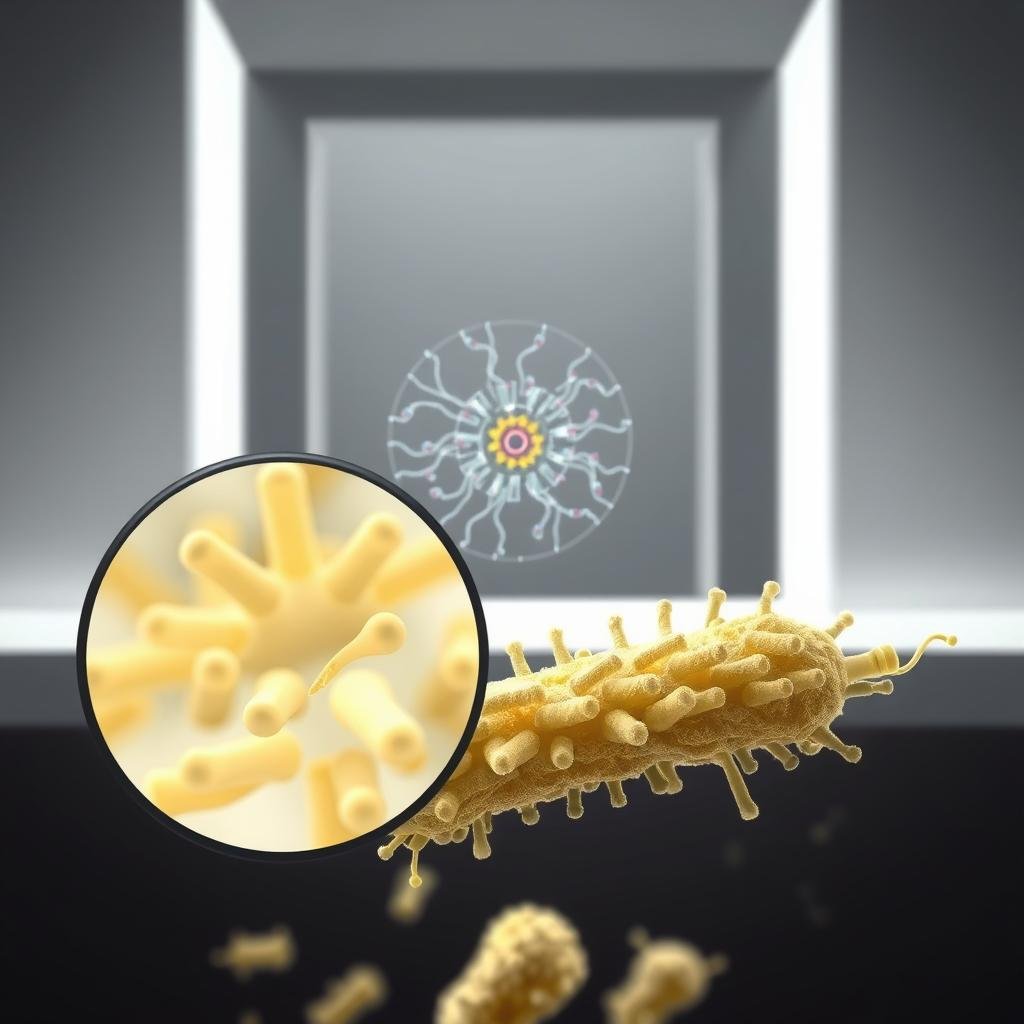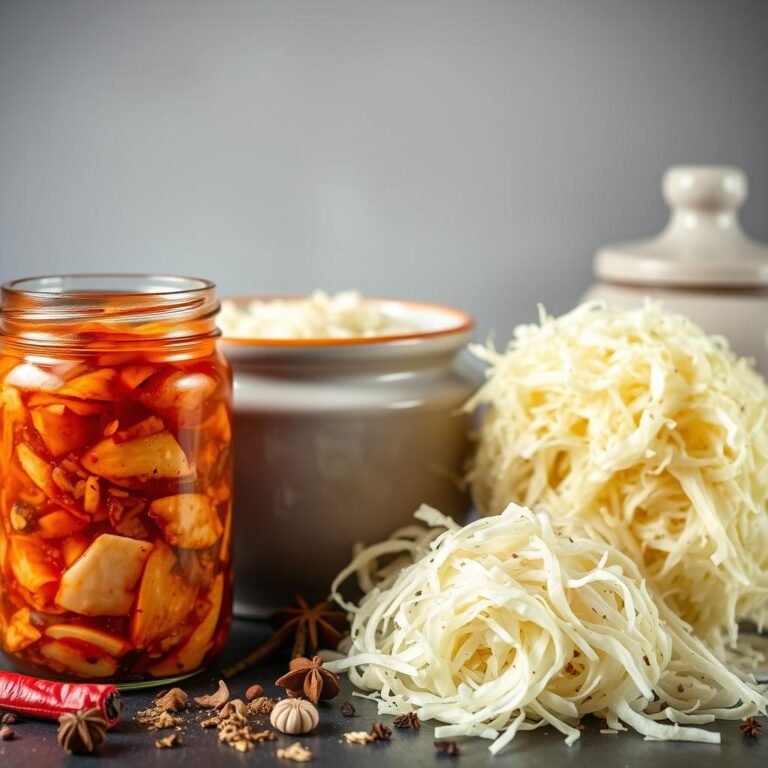Why You Should Eat Yogurt After Antibiotics? A True Probiotic

Antibiotics fight bacterial infections but can upset your gut’s balance. This upset can harm your digestion. Eating yogurt after antibiotics can help. It has live probiotic cultures that can balance your gut flora. This can lessen side effects like diarrhea.
Yogurt adds good bacteria to your gut. This is key to getting your gut health back after antibiotics. Studies also show it helps your digestion work better after antibiotics.
The Impact of Antibiotics on Gut Health
Antibiotics are a mixed bag. They fight off bad bacteria but harm the good ones in our gut. This messes up our gut’s ecosystem, leading to health problems. We need to think carefully about how to get our gut health back after antibiotics.
Disruptions in Gut Microbiome
Antibiotics kill both good and bad bacteria in our gut. This makes our gut’s ecosystem less diverse. Older people, babies, and young kids take longer to get their gut back to normal. Eating foods low in fiber before antibiotics makes it even harder.
Side Effects of Antibiotics Like Diarrhea
One common side effect of antibiotics is diarrhea. This happens because good bacteria in our gut are lost. Eating probiotic-rich foods like yogurt can help. Also, eating a variety of prebiotic foods like veggies and fruits is key.
For more info on antibiotics and gut health, check out UCLA Health News.
Benefits of Yogurt After Antibiotics
Yogurt is a great help after antibiotics. It helps in many ways, like fixing gut bacteria, cutting down on diarrhea, and making digestion better.
Restoring Gut Flora
Antibiotics can kill good bacteria in the gut. This can cause digestive problems. Eating yogurt with probiotics, like Bifidobacterium lactis, helps fix this. It makes the gut healthy again.
Yogurt is key to good gut health after antibiotics. For more on probiotics, see this article.
Reducing Antibiotic-Associated Diarrhea
Diarrhea is a common side effect of antibiotics. Yogurt can help a lot. Its active cultures fight off bad bacteria, cutting down on diarrhea.
Improving Digestion and Absorption
Yogurt also helps with digestion and nutrient absorption. The probiotics in yogurt make the gut better at breaking down food and absorbing nutrients. This helps you recover faster and feel better.
Probiotics in Yogurt for Gut Health
Yogurt is known for its probiotics, which are good for your gut. Eating the best yogurt can give your body helpful bacteria. This helps you absorb nutrients better and keeps bad bacteria away. Yogurt is also great after you’ve taken antibiotics to help your gut get back in balance.
Introduction to Probiotics
Probiotics are live bacteria that are good for you. They are found in yogurt and help keep your digestive system healthy. After antibiotics, probiotics can help get your gut’s natural balance back.
Specific Probiotic Strains in Yogurt
Yogurt has different types of probiotics that do different things. Lactobacillus and Bifidobacterium are two important ones. Lactobacillus makes your gut less welcoming to bad bacteria. Bifidobacterium helps with digestion and boosts your immune system.
| Probiotic Strain | Benefits |
|---|---|
| Lactobacillus | Supports digestive health, improves lactose digestion |
| Bifidobacterium | Enhances immune response, aids in nutrient absorption |
To pick the best yogurt for your gut, look for ones with lots of Lactobacillus and Bifidobacterium. Adding these to your diet can make your digestive system stronger. This is very helpful after you’ve taken antibiotics.
How Yogurt Helps Maintain Bacterial Balance

Yogurt has live cultures that help keep the gut balanced. These good bacteria are key, more so after antibiotics. They help bring back the healthy bacteria in your gut.
Yogurt’s live cultures, like Lactobacillus and Bifidobacterium, help replace lost bacteria. A balanced gut is key for good digestion and a strong immune system. Eating yogurt regularly helps keep your digestive system strong.
| Benefit | Description |
|---|---|
| Replenishes Beneficial Bacteria | Yogurt introduces live cultures to the gut, restoring the balance of microbial flora. |
| Enhances Digestive Health | Maintaining a balanced microbial environment aids in effective digestion and nutrient absorption. |
| Supports Immune Function | A healthy gut flora plays a critical role in boosting the body’s immune response. |
Choosing the Best Yogurt for Gut Health
When picking yogurt to boost gut health, after antibiotics, focus on a few key points. Look for yogurt with live cultures and check the ingredients. This helps get the most from probiotics.
Live and Active Cultures
Live and active cultures are key in yogurt for gut health. Probiotics, found in these cultures, help restore gut bacteria lost to antibiotics. Make sure the yogurt has the “live and active cultures” seal.
Avoiding Added Sugars and Artificial Ingredients
Also, steer clear of yogurts with added sugars and artificial stuff. These can harm the probiotics and your health. Opt for plain or lightly sweetened yogurt with natural ingredients. This way, you get more benefits for your gut.
The Role of Bifidobacterium lactis BB-12

Bifidobacterium lactis BB-12 is a strong probiotic. It helps a lot with gut health, mainly when we take antibiotics. It keeps our gut flora healthy and helps with digestion problems caused by antibiotics.
Clinical Studies and Findings
A study at Georgetown University looked at Bifidobacterium lactis BB-12. They gave some people yogurt with BB-12 and others plain yogurt. The ones with BB-12 got their gut health back faster after antibiotics.
This study showed that BB-12 increases fecal acetate levels. This is good for our digestion.
The study was well done. It shows how important it is to use good probiotics after antibiotics. You can read more about it here.
Effectiveness in Maintaining Gut Health
Bifidobacterium lactis BB-12 is great for keeping our gut healthy during antibiotic use. It helps replace good bacteria lost during antibiotics. This lowers the chance of diarrhea and other stomach issues.
It has at least 1 × 10 colony-forming units per serving. This means it works well and consistently.
Adding BB-12 to our diet through yogurt is a smart way to support our gut. It’s a great choice for using probiotics after antibiotics.
Timing and Consumption of Yogurt During Antibiotic Treatment
To get the most from yogurt after antibiotics, start eating it at the right time. Yogurt, full of live cultures, helps keep your gut healthy after antibiotics.
Starting Early for Maximum Benefits
Start with yogurt as soon as you begin antibiotics. This helps keep good bacteria in your gut. It also lowers the chance of diarrhea from antibiotics.
Daily Consumption Recommendations
Eating yogurt every day while on antibiotics is best. Wait at least two hours after antibiotics to eat yogurt. This keeps the probiotics in yogurt alive. For more on keeping your gut healthy, read here.
Other Fermented Foods to Consider

Fermented foods are great for gut health after antibiotics. Good choices include sauerkraut, kimchi, and kefir. They are full of probiotics, which help balance your gut.
Fermented foods are good for your digestive system. Sauerkraut and kimchi have many bacteria that help digest food better. Kefir, a fermented milk drink, is also packed with probiotics.
Adding different fermented foods to your diet is key. It helps your gut bacteria grow. This is important for a healthy gut. Foods like miso, tempeh, and kombucha are great for this.
Incorporating High Fiber and Prebiotic Foods
Eating foods high in fiber and prebiotics can help your gut after antibiotics. Soluble fiber helps good bacteria grow. Prebiotics give these bacteria the food they need.
Benefits of Soluble Fiber
Soluble fiber is in foods like oats, apples, and carrots. It turns into a gel in water. This fiber is good for your gut bacteria and helps control blood sugar and cholesterol.
Eating foods high in fiber can make your digestion better.
Prebiotic Foods to Boost Gut Health
Prebiotic foods, like onions, garlic, and green bananas, are great for your gut. They feed the good bacteria in your gut. This helps with digestion and boosts your immune system.
Other good prebiotics are asparagus, chicory root, and dandelion greens. These foods are easy to add to your meals. For more tips on healing your gut after antibiotics, check out this resource.
| Category | Foods | Benefits |
|---|---|---|
| Soluble Fiber | Oats, Apples, Carrots | Boosts beneficial gut bacteria, Regulates blood sugar |
| Prebiotic Foods | Onions, Garlic, Green Bananas | Provides nutrients for probiotics, Enhances gut health |
Adding these foods to your diet can help your gut health. It supports a balanced and healthy digestive system.
Yogurt for Digestive and Immune Support
Yogurt can make your digestion and immune system better. It has live cultures that help your gut. This is key for feeling good overall.
Enhancing Digestive Health
Yogurt is great for your stomach. It has probiotics that balance your gut. These good bacteria help digest food better and reduce bloating.
Probiotics like Lactobacillus and Bifidobacterium in yogurt fix your gut’s balance. They also ease digestive problems.
Boosting Immune Function
Yogurt also boosts your immune system. Your gut and immune system are closely linked. Yogurt’s probiotics strengthen your immune cells.
Yogurt keeps your immune system healthy. Eating it regularly makes your immune system strong. It’s good for your stomach and immune health.
Potential Drawbacks and Myths About Yogurt
Yogurt is often seen as a superfood. But, there are myths about yogurt that need to be cleared up. It’s important to know the truth about these myths to make good food choices.
Common Misconceptions
One big myth is that yogurt makes you gain weight. While some yogurts have added sugars, many are healthy and low in sugar. Also, not all yogurts have good bacteria. Look for the “live and active cultures” label to get the probiotic benefits.
Addressing Lactose Intolerance Concerns
Many think people with lactose intolerance can’t eat yogurt. But, this is a big myth. Yogurt’s fermentation process cuts down its lactose. The live cultures in yogurt also help break down lactose, making it easier to digest for those with lactose intolerance.
| Myth | Fact |
|---|---|
| Yogurt causes weight gain | Opt for low-sugar and live-culture varieties to avoid unnecessary calories. |
| All yogurts are the same | Check for the “live and active cultures” label to ensure probiotic benefits. |
| Lactose intolerant individuals can’t consume yogurt | The fermentation process reduces lactose content, and live cultures help in digestion. |
Yogurt After Antibiotics: Practical Tips and Recipes
Adding yogurt to your diet after antibiotics helps your gut health. Here are some easy tips and tasty recipes to enjoy yogurt every day.
Simple Recipes to Try
Yogurt recipes for gut health are easy to make. Here are a few simple ones:
- Yogurt Smoothie: Mix 1 cup yogurt, berries, banana, and honey for a healthy morning.
- Yogurt Parfait: Layer yogurt, granola, fruit, and honey in a glass for a yummy treat.
- Homemade Yogurt Bowls: Mix yogurt with nuts, seeds, and cinnamon for a protein-rich breakfast or snack.
Incorporating Yogurt into Your Daily Diet
It’s easy to make yogurt a part of your daily routine. Here’s how:
- Breakfast Boost: Use yogurt instead of milk in cereal or oatmeal for probiotics and creaminess.
- Lunchtime Addition: Add yogurt to your lunchbox or salads for extra nutrition.
- Snack Time: Enjoy a yogurt cup as a snack or use it for dips and spreads.
Regularly eating yogurt can improve digestion and gut health. These easy recipes can greatly benefit your well-being.
| Recipe | Ingredients | Benefits |
|---|---|---|
| Yogurt Smoothie | Yogurt, berries, banana, honey | Rich in antioxidants, probiotics, and vitamins |
| Yogurt Parfait | Yogurt, granola, fresh fruit, honey | High in fiber, protein, and probiotics |
| Homemade Yogurt Bowls | Yogurt, nuts, seeds, cinnamon | Packed with proteins, healthy fats, and probiotics |
Further Research and Future Directions
Science is learning more about the human gut microbiome every day. This means we’ll soon know more about how probiotics work. They are special bacteria that help us after we take antibiotics.
Scientists want to find the best probiotics for each person. They aim to fix the problems antibiotics cause. This could lead to better treatments for everyone.
New studies are looking at making probiotics just for you. This means your probiotics will match your body’s needs perfectly. It could make probiotics even better at fixing your gut and avoiding side effects from antibiotics.
Researchers are also studying how different probiotics react with food, lifestyle, and genes. They want to find ways to improve gut health in many ways. As we learn more, we’ll see new ways to help our guts, tailored just for us.





